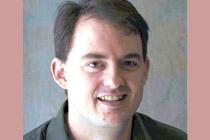Jacob Hamblin: "How the Cold War Gave Birth to Catastrophic Environmentalism"

Jacob Hamblin: "How the Cold War Gave Birth to Catastrophic Environmentalism"
Jacob Hamblin will discuss how the forces of nature in war—for example, to change the course of ocean currents, to manipulate the weather, and to melt polar ice caps—found receptive ears among powerful patrons throughout the Cold War.
Hamblin's research has explored the history of the earth and environmental sciences and the history of nuclear issues. His scholarly articles have appeared in Isis, Osiris, Technology & Culture, Diplomatic History, Environmental History, and several other journals. His first book, Oceanographers and the Cold War, assessed the military, political, and economic motivations behind international cooperative ventures in the marine sciences after World War II. His second book, Poison in the Well: Radioactive Waste in the Oceans at the Dawn of the Nuclear Age, was the first international history of one of the least-understood environmental controversies during the Cold War era.
Hamblin’s talk will include material from his current project, Arming Mother Nature: How Modern Science and the Cold War Gave Birth to Catastrophic Environmentalism which currently under contract with Oxford University Press.

